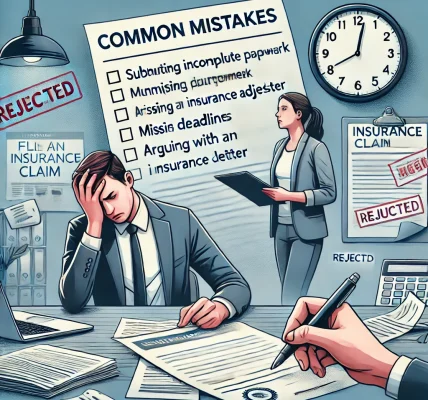Car accidents can be stressful, and filing an insurance claim can add to the challenge, especially if there is no First Information Report (FIR) from the police. While many believe an FIR is mandatory for all insurance claims, this is not always the case. Certain types of claims, such as minor damages and own-damage claims, can be processed without an FIR.
In this guide, we will explain the process of claiming car insurance for accidents without an FIR, the situations where an FIR is not required, and the steps to ensure a smooth and hassle-free claim process.
When Is an FIR Not Required for a Car Insurance Claim?
An FIR is generally required in cases involving major accidents, bodily injuries, third-party liabilities, theft, or legal disputes. However, in the following cases, an FIR is not mandatory:
- Minor Accidents with No Third-Party Involvement – If your car has sustained minor damages, and no other vehicle or person is involved, you can file an own-damage claim without an FIR.
- Self-Inflicted Damages – If your car is damaged due to personal negligence (e.g., hitting a pole, wall, or pothole), an FIR is usually not required.
- Single-Vehicle Accidents – Accidents where only your vehicle is affected (such as skidding on a wet road or colliding with an object) do not need an FIR.
- Natural Calamities and Fire Damage – Damage caused by floods, storms, earthquakes, or fire can be claimed without an FIR, provided it falls under your policy coverage.
- Scratches, Dents, and Minor Repairs – Small dents or scratches caused by parking mishaps or other non-collision incidents can be covered without police intervention.
Step-by-Step Guide to Claim Car Insurance Without an FIR
If your accident falls under any of the above-mentioned cases, follow these steps to claim your car insurance without an FIR:
Step 1: Inform Your Insurance Provider Immediately
- Contact your insurer via phone, email, or mobile app.
- Provide preliminary details about the accident, including date, time, and location.
- Ask about the required documents and claim process specific to your policy.
Step 2: Collect Evidence of the Accident
- Take clear photographs of the damaged vehicle from multiple angles.
- Capture videos showing the extent of the damage.
- If possible, take witness statements or contact details of bystanders who saw the incident.
- Maintain a record of location details and the cause of the accident.
Step 3: Get an Estimate for Repairs
- Visit an authorized garage or service center for damage assessment.
- Obtain a written estimate of repair costs.
- Many insurers have a cashless claim facility with network garages, so check for eligible service centers.
Step 4: Submit Required Documents
Prepare and submit the following documents for claim processing:
- Duly filled claim form (available on the insurer’s website or branch office)
- Copy of the insurance policy
- Vehicle registration certificate (RC copy)
- Driver’s license copy (of the person driving the vehicle at the time of the accident)
- Damage photographs and videos
- Repair estimates from the garage
- Any other documents requested by the insurer
Step 5: Surveyor Inspection
- The insurance company will assign a surveyor to assess the damage.
- The surveyor will inspect the vehicle and verify the accident details.
- Based on the surveyor’s report, the claim will be processed.
Step 6: Claim Approval and Repairs
- Once approved, you can proceed with vehicle repairs.
- If using a cashless garage, the insurer will pay the garage directly.
- If using a non-network garage, pay for repairs and get reimbursed by the insurer.
Types of Car Insurance Claims Without FIR
There are primarily two types of car insurance claims that do not require an FIR:
1. Own-Damage Claims
These claims cover damages to your own vehicle caused by an accident, fire, or natural calamities. FIR is not required unless there is involvement of a third party or legal issue.
2. Zero Depreciation or Add-On Claims
If you have opted for add-ons like zero depreciation, engine protection, or roadside assistance, you can claim these benefits without an FIR, provided they are applicable to the type of damage incurred.
Common Mistakes to Avoid When Filing a Car Insurance Claim Without FIR
- Delaying the Claim Notification – Always inform the insurer immediately to avoid claim rejection.
- Providing Incorrect Information – Ensure all details in the claim form are accurate.
- Repairing the Vehicle Before Inspection – Wait for the insurance company’s approval before proceeding with repairs.
- Ignoring Minor Damages – Even small damages should be reported, as they might escalate later.
- Not Keeping Copies of Documents – Always retain copies of all submitted documents for future reference.
Frequently Asked Questions (FAQs)
Q1: Is an FIR mandatory for all car insurance claims?
No, an FIR is only required in cases involving third-party damage, bodily injuries, theft, or major accidents. Minor damages and own-damage claims do not require an FIR.
Q2: How long do I have to file a car insurance claim?
Most insurers require you to file a claim within 24 to 48 hours of the accident. Check your policy terms for specific deadlines.
Q3: Can I claim car insurance for a dent or scratch?
Yes, if your policy covers minor damages, you can file a claim. However, consider the deductibles and no-claim bonus (NCB) implications before proceeding.
Q4: Will my premium increase if I claim insurance without an FIR?
Filing a claim may impact your no-claim bonus (NCB), which could lead to a higher premium upon renewal.
Q5: What if my claim is rejected?
If your claim is rejected, review the insurer’s reasons. If necessary, appeal with additional documents or seek assistance from the Insurance Ombudsman.
Final Thoughts
Claiming car insurance without an FIR is entirely possible for minor damages, own-damage claims, and self-inflicted accidents. By following the correct procedure, gathering the necessary documents, and staying in touch with your insurer, you can ensure a smooth and hassle-free claim process.
Always read your policy’s terms and conditions to understand what is covered and what is not. Being well-informed about the process will help you avoid delays and get the maximum benefits from your car insurance policy.
By following these steps, you can confidently handle insurance claims without the added stress of filing an FIR, ensuring peace of mind during an already challenging situation.



